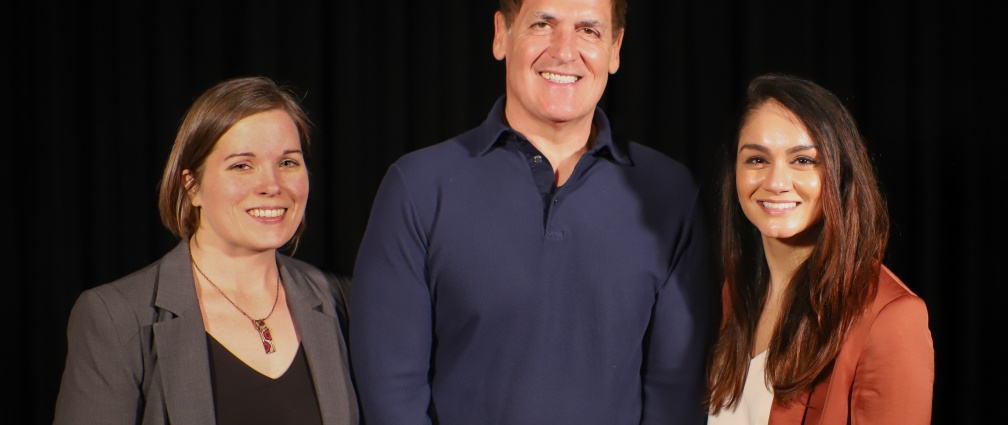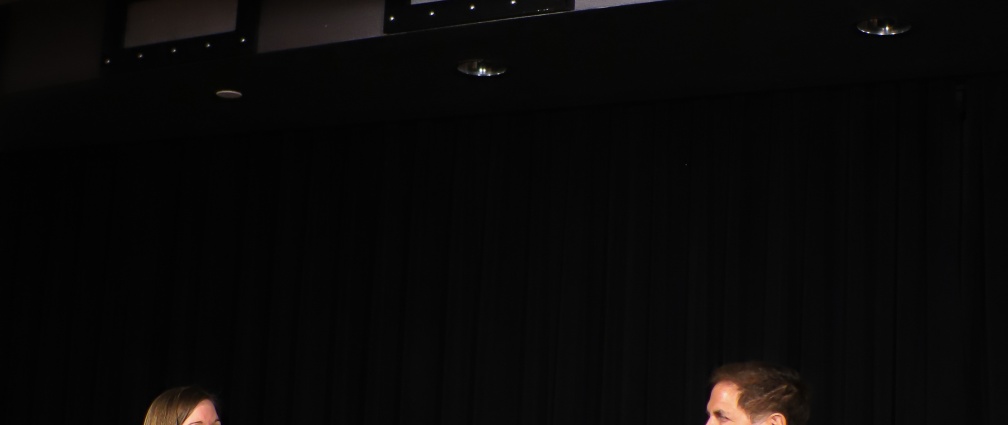(Originally published in March 2023.)
For more than 10 years, Stacie Dusetzina, PhD, Ingram Professor of Cancer Research and Professor of Health Policy, and fellow researchers analyzed the financial impact of prescription drugs used by millions of Americans enrolled in Medicare insurance plans. In many cases, drugs cost so much for some patients, they are left in financial ruin for health conditions they have developed at no fault of their own, like cancer or diabetes.
Policies have attempted to reduce the financial stress on patients, but in 2022 Dusetzina and hundreds of others gathered at the White House to celebrate bipartisan effort to improve affordability for Americans and make health care less expensive for everyone, which relied on the research of Dusetzina and other experts.
Dusetzina joined Mark Cuban, founder of Cost Plus Drugs Co., and Ruchika Talwar, MD, Urologic Oncology fellow in VUMC’s Department of Urology, for a lecture and discussion on the efforts to reduce prescription drug prices for Americans and explain the underlying issues that make some drugs very expensive.
Ultimately, it's these accomplishments — when policy is rooted in research — which is the Department of Health Policy's goal: to have an impact on policy formulation through its research and evidence. For nearly 10 years, Dr. Dusetzina had focused her research on one core policy issue that has been of interest to lawmakers of all political stripes: the affordability of prescription drugs.
Since this issue arose late in the 2010s, with bipartisan interest in the potential to save millions of Americans on Medicare thousands of dollars annually at the pharmacy counter, Dusetzina has been a central figure in developing evidence and analysis to inform policymakers about the need for reform.
It’s just one example of how the department faculty have been influential in Medicare and Medicaid reform discussions, and had direct impact on new and existing policy formulation, evaluation and revision.
In 2022, Dusetzina published attention-grabbing research finding 30% of cancer patients not receiving subsidies don’t initiate prescription drug cancer therapy, likely due to high out-of-pocket costs, and some cancer therapeutics can cost more than $10,000 out of pocket for a single year of treatment, some above $3,000 for the first fill.
A Decade Collecting Evidence
Her focus on Medicare Part D began after reading a piece in The New York Times about rising drug prices and the impact on patients. About 10 years before, prior to officially joining the tenure-track faculty in 2018, Dusetzina used her training to start unpacking why drugs cost so much and how that affected patients needing those medications.
After more than 90 peer-reviewed publications, countless conversations with two White House administrations and dozens of policymakers on Capitol Hill, Dusetzina and colleagues were able to reflect on the South Lawn of the White House in the summer of 2022 about how their contributions through research and data informed the provisions in the Inflation Reduction Act that will save older Americans on Medicare tens of thousands of dollars in out-of-pocket costs each year.
“The idea that some of my work made a difference in fixing a program that I really care about and that I knew could be made better—that’s something special,” Dusetzina said. “There are nearly 50 million people in Medicare Part D right now (in 2022). Not all of them need expensive drugs right now, but they will have the financial security of knowing that if they do need them, they will be able to afford them.”
“Stacie is one of our nation’s leading scientists studying drug pricing and access to high-cost medications,” said Nancy Keating, MD, MPH, professor of Health Care Policy and an internist at Harvard University, who has collaborated with Dusetzina several times on Part D research. “The evidence that she has generated related to the role of high out-of-pocket spending on medication nonadherence and medication non-initiation has shed a spotlight on the problems of the Part D benefit and was key to the recent legislation seeking to make prescription drugs more affordable to Medicare beneficiaries.”
The Future of Part D Reform
The legislation was formally signed into law in September 2022. Dusetzina will continue to analyze the longer-term impacts of the Inflation Reduction Act and new policy options.
“Turns out there are still lots of problems to solve around drug prices and access, even though I think we fixed Part D for the most part,” Dusetzina said. “I’m working on some new projects that focus more broadly on Medicare plan choices and how to make sure people pick the right plans for them and on how to give people better information about drug prices at the time of prescribing.
“I’m also really interested in seeing how these changes will unfold in the Medicare program and how drug companies will respond with their pricing for new drugs. Ultimately, we have to fix prices and coverage if we are going to solve health care affordability. There is going to be a lot to keep me busy.”



